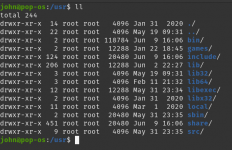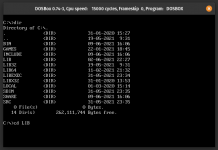You can still download IBM FileCommand - https://winworldpc.com/product/filecommand/100 Still the fastest, least restrictive file manager around nearly 40 years later.
Mike
Mike
Volkov Commander is a super fast, memory efficient & free Norton clone. Mostly ASM I think.
I used Xtree or Xtree Gold in Dos because it had a command PRUNE in which you could delete the whole directory including the nestled directories within it as well as all the hidden files within them.Other file managers I had use prior would refused to to delete a directory if there was any content in it.
Can someone explain the appeal of a dos file manager to me? Is the dos command line really that hard to use?
Doesn't tab completion allow you to navigate around on the command line quickly even if the filenames are long?How many of the above understand DOS 7+ long file names?
Under DOS 7+ or FeeDOS, I get a list of the 8.3 "mangled" names.
That is, instead of "Development" I get "DEVEL~YX"; if I type "cd Development", of course that works.
Debian Linux gives you a list of names after the second tab press--it's just as easy to use wildcards there. Of course, wildcards don't work the same in DOS--I can't say "cd Dev*" and expect anything but an error.
A long file name under QDOS with give you "YadaYaY~". Note the "~". It will in no way change or alter the original file name.
Can someone explain the appeal of a dos file manager to me? Is the dos command line really that hard to use?
What happens if you type "cd dev", press tab, and then press enter?Under DOS 7+ or FeeDOS, I get a list of the 8.3 "mangled" names.
That is, instead of "Development" I get "DEVEL~YX"; if I type "cd Development", of course that works.
Debian Linux gives you a list of names after the second tab press--it's just as easy to use wildcards there. Of course, wildcards don't work the same in DOS--I can't say "cd Dev*" and expect anything but an error.


Volkov Commander is a super fast, memory efficient & free Norton clone. Mostly ASM I think.
This seems to hold true even with really long file names, at least in Dosbox:
If I type "cd r", press tab twice, and press enter, I find myself in the second folder.
On DOS, I suppose that it boils down to "Do any of these file managers have the smarts to use the extended name APIs?" (i.e. DOS interrupt 21h, 71xx calls). Evidently not.
